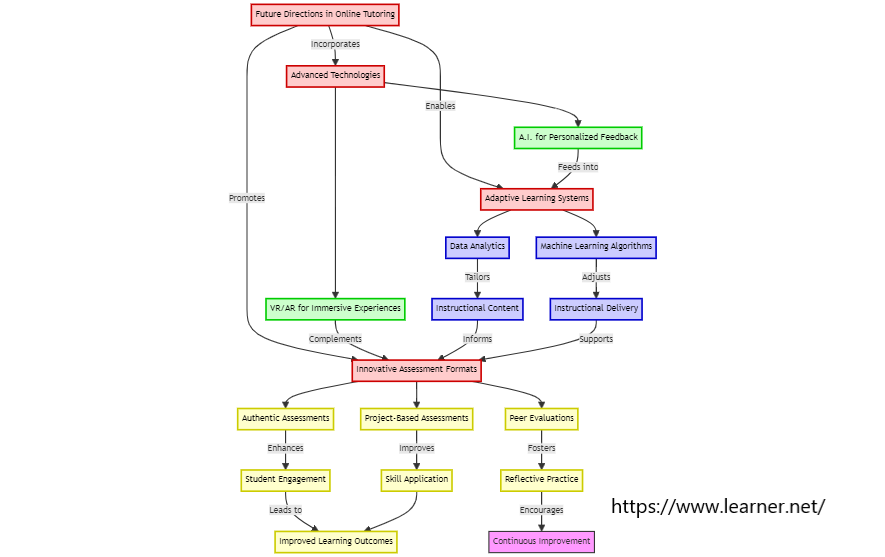Online tutoring has become a prevalent means of supplementing income or even replacing traditional employment, offering flexibility and accessibility to both tutors and learners. The global e-learning market size reached over $200 billion USD in 2022 and is expected to reach more than $500 billion USD by 2027, with online tutoring playing a significant role in this growth. With the rise of digital platforms and communication technologies, individuals can now engage in tutoring sessions remotely, connecting with students worldwide.
Amid this rapidly growing landscape, the importance of self-assessment and self-evaluation for online tutors is imperative for those that wish to remain capable of supplementing or replacing their income, especially if this path may become a new career choice.
As educators operating in virtual environments, tutors must continually assess and evaluate their performance to ensure effective teaching practices and positive learning outcomes for students. Self-assessment involves introspection and critical reflection on one’s teaching methods, communication skills, and overall effectiveness as an instructor.
Self-evaluation, on the other hand, entails analyzing feedback from students, peers, and supervisors, identifying areas for improvement, and setting goals for professional development. By actively engaging in self-assessment and self-evaluation, online tutors can enhance their teaching effectiveness, adapt to diverse learning needs, and maintain high-quality standards in their educational services.
One of the primary benefits of self-assessment and self-evaluation is the ability to tailor teaching approaches to meet individual student needs. Through reflective practices, tutors can identify strengths and weaknesses in their instructional methods, adjust their strategies accordingly, and provide personalized support to learners. This personalized approach fosters a more engaging and interactive learning experience, ultimately leading to improved academic performance and student satisfaction.
Moreover, self-assessment and self-evaluation promote continuous professional development and lifelong learning among online tutors. By actively seeking feedback, reflecting on teaching experiences, and implementing constructive changes, tutors can refine their skills, expand their knowledge base, and stay abreast of emerging trends in education and technology. This ongoing pursuit of excellence not only benefits tutors personally but also enhances the overall quality of online tutoring services.
Self-assessment and self-evaluation play a vital role in the effectiveness of online tutoring by enabling tutors to reflect on their teaching practices, identify areas for improvement, and adapt to the evolving needs of learners. By embracing reflective practices and actively seeking feedback, online tutors can enhance their teaching effectiveness, promote student engagement, and achieve positive learning outcomes in virtual learning environments. As the demand for online education continues to grow, the role of self-assessment and self-evaluation will remain paramount in ensuring the quality and success of online tutoring initiatives.
Understanding Self-Assessment and Self-Evaluation
Collectively, self-assessment and self-evaluation for tutors and teachers alike, is key to successfully engaging in the practice of reflective teaching whether in a digital environment or in a traditional educational institution. Self-assessment and self-evaluation are essential components of professional development for online tutors, providing opportunities for introspection and critical reflection on teaching practices and student outcomes. While these terms are often used interchangeably, they encompass distinct processes and objectives in the context of education.
Self-assessment involves the systematic review and analysis of one’s own performance, skills, and knowledge in relation to predefined criteria or standards. It requires individuals to evaluate their strengths, weaknesses, and areas for improvement independently, without external feedback or evaluation.
In contrast, self-evaluation entails a more comprehensive assessment that incorporates feedback from students, peers, and supervisors, allowing tutors to gain insights into their teaching effectiveness and make informed decisions about professional development.
The importance of self-assessment and self-evaluation lies in their ability to foster introspection and critical reflection among tutors. By engaging in these processes, tutors can gain a deeper understanding of their teaching methods, communication strategies, and instructional approaches, identifying strengths to leverage and weaknesses to address.
Moreover, self-assessment and self-evaluation encourage tutors to actively seek feedback, soliciting input from both students and colleagues to inform their practice and enhance learning outcomes.
Introspection and critical reflection are integral to the growth and improvement of online tutors. Through self-assessment, tutors can identify areas for development and set realistic goals for professional growth.
By evaluating their teaching effectiveness and student engagement, tutors can adapt their instructional strategies, implement innovative techniques, and tailor learning experiences to meet diverse student needs. This reflective practice not only enhances teaching efficacy but also promotes a culture of continuous improvement and lifelong learning among tutors.
Self-assessment and self-evaluation contribute significantly to the professional growth and improvement of online tutors in several ways. These processes facilitate ongoing reflection on teaching practices and student outcomes, allowing tutors to refine their instructional methods and adapt to evolving educational trends.
Self-assessment and self-evaluation enable tutors to identify areas for professional development and seek out relevant training, resources, and support to enhance their skills and knowledge. Additionally, by incorporating feedback from students and colleagues, tutors can foster collaborative learning environments and strengthen their relationships with learners.
Self-assessment and self-evaluation are essential practices for online tutors seeking to enhance their teaching effectiveness and promote student success. By engaging in introspection and critical reflection, tutors can identify areas for improvement, adapt their instructional strategies, and contribute to their professional growth and development. As the demand for online education continues to grow, the role of self-assessment and self-evaluation in supporting effective teaching practices will remain paramount.
Benefits of Self-Assessment and Self-Evaluation for Online Tutors
Self-assessment and self-evaluation offer many benefits that contribute to enhanced teaching effectiveness, improved student engagement, and continuous professional development. By engaging in these reflective practices, online tutors can identify strengths and weaknesses in their teaching methods and materials, tailor their approaches to meet individual student needs, and promote lifelong learning.
One of the primary benefits of self-assessment and self-evaluation for online tutors is the opportunity to enhance teaching effectiveness. Through introspection and critical reflection, tutors can evaluate their instructional strategies, communication techniques, and assessment methods to determine what is working well and what can be improved.
By identifying areas for development, tutors can adapt their teaching practices to better engage students, clarify concepts, and facilitate meaningful learning experiences in the online environment.
Moreover, self-assessment and self-evaluation enable online tutors to successfully identify their strengths and weaknesses in teaching methods and materials. Tutors can assess their ability to effectively communicate complex concepts, provide clear instructions, and create engaging learning materials that resonate with diverse learners.
By acknowledging areas of strength, tutors can leverage their expertise to enhance student learning outcomes. Simultaneously, recognizing areas for improvement allows tutors to seek out professional development opportunities, such as workshops, courses, or mentorship programs, to enhance their skills and knowledge.
Tailoring tutoring approaches to meet individual student needs is another significant benefit of self-assessment and self-evaluation for online tutors. By reflecting on student performance, feedback, and learning preferences, tutors can adapt their instructional strategies to accommodate diverse learning styles, abilities, and interests. For example, tutors may use differentiated instruction techniques to provide personalized support, adjust the pace and complexity of lessons to meet individual learning needs, or incorporate multimedia resources to enhance student engagement and comprehension.
Additionally, self-assessment and self-evaluation promote continuous professional development and lifelong learning among online tutors. By actively engaging in reflective practices, tutors demonstrate a commitment to ongoing growth and improvement in their teaching practice.
This commitment to professional development fosters a culture of continuous learning, where tutors are encouraged to explore new teaching methodologies, technologies, and pedagogical approaches to enhance their effectiveness in the online classroom.
Furthermore, self-assessment and self-evaluation empower online tutors to take ownership of their professional growth and development. Rather than relying solely on external feedback or evaluations, tutors can proactively assess their own performance, set goals for improvement, and track their progress over time.
This self-directed approach to professional development encourages autonomy, accountability, and resilience in the face of challenges, empowering tutors to overcome obstacles and achieve their full potential as educators.
Self-assessment and self-evaluation play a crucial role in the success of online tutors by enhancing teaching effectiveness, promoting student engagement, and fostering continuous professional development. By reflecting on their teaching practice, identifying strengths and weaknesses, and tailoring their approaches to meet individual student needs, tutors can create more engaging and effective learning experiences in the online classroom.
Moreover, by embracing a mindset of lifelong learning and continuous improvement, online tutors can stay abreast of emerging trends, technologies, and best practices in education, ensuring they remain effective and relevant educators in the digital age.
Successful Strategies for Effective Self-Assessment and Self-Evaluation
Effective self-assessment and self-evaluation are essential for online tutors to be capable of continuously improve their teaching practice and enhance student learning outcomes. By implementing various strategies, such as setting clear learning objectives and specific goals, using feedback mechanisms, engaging in reflective journaling and self-reflection exercises, and seeking professional development opportunities and mentorship, online tutors can enhance their effectiveness in the virtual classroom.
One strategy for effective self-assessment and self-evaluation for online tutors is to set clear learning objectives and goals. By clearly defining what they aim to achieve in each tutoring session or course, tutors can align their instructional strategies and assessment methods with these objectives, ensuring that their teaching remains focused and purposeful. Setting SMART (Specific, Measurable, Achievable, Relevant, Time-bound) goals allows tutors to track their progress and evaluate their success in meeting student learning outcomes.
Another strategy is to utilize feedback mechanisms, such as student evaluations and peer reviews, to gather insights into the effectiveness of their teaching practice. Student evaluations provide valuable feedback on the clarity of instruction, relevance of course materials, and overall satisfaction with the learning experience. Likewise, peer reviews enable tutors to receive constructive criticism and suggestions for improvement from fellow educators, fostering a culture of collaboration and continuous learning.
Reflective journaling and self-reflection exercises are also effective strategies for online tutors to assess their teaching practice and identify areas for improvement. By regularly documenting their teaching experiences, challenges, and successes, tutors can gain valuable insights into their teaching style, communication techniques, and instructional strategies.
Self-reflection exercises, such as journal prompts or guided reflection activities, encourage tutors to critically evaluate their teaching methods, strengths, and areas for growth, leading to more informed decision-making and professional development.
Additionally, seeking professional development opportunities and mentorship can greatly enhance the self-assessment and self-evaluation process for online tutors. Engaging in workshops, seminars, or online courses related to teaching and learning allows tutors to acquire new skills, techniques, and best practices to enhance their effectiveness in the virtual classroom.
Moreover, connecting with experienced educators or mentors provides valuable guidance, support, and feedback, helping tutors navigate challenges, overcome obstacles, and grow professionally.
Effective self-assessment and self-evaluation are vital components of successful online tutoring. By implementing strategies such as setting clear learning objectives and goals, utilizing feedback mechanisms, engaging in reflective journaling and self-reflection exercises, and seeking professional development opportunities and mentorship, online tutors can continuously improve their teaching practice, enhance student engagement and learning outcomes, and contribute to their own professional growth and development.
Challenges and Considerations in Self-Assessment and Self-Evaluation
Online tutors face numerous challenges and considerations when engaging in self-assessment and self-evaluation. These challenges include overcoming biases and maintaining objechttps://www.science.gov/topicpages/a/academic+tutoring+studenttivity, dealing with constructive criticism and setbacks, and balancing self-assessment with external evaluations and standards.
One significant challenge for online tutors is overcoming biases and maintaining objectivity during self-assessment and self-evaluation processes. Biases, whether conscious or unconscious, can influence how tutors perceive their teaching effectiveness and impact their ability to accurately assess their strengths and weaknesses. To overcome biases, tutors must strive to maintain objectivity by seeking feedback from multiple sources, considering diverse perspectives, and critically evaluating their teaching practices.
Another challenge is dealing with constructive criticism and setbacks. Constructive criticism, while valuable for professional growth, can be difficult to receive, especially when it highlights areas for improvement or suggests changes to teaching methods. Tutors must cultivate resilience and a growth mindset to view feedback as an opportunity for learning and improvement rather than a reflection of personal failure. By embracing feedback with an open mind and a willingness to adapt, tutors can leverage constructive criticism to enhance their teaching effectiveness and student learning outcomes.
Balancing self-assessment with external evaluations and standards presents another challenge for online tutors. While self-assessment allows tutors to reflect on their teaching practice and identify areas for improvement, external evaluations and standards provide additional benchmarks for measuring teaching effectiveness and ensuring alignment with educational objectives. Tutors must navigate the tension between self-perception and external expectations, striving to meet both personal and professional standards while maintaining authenticity and integrity in their teaching approach.
In addition to these challenges, online tutors must consider several key factors when engaging in self-assessment and self-evaluation. These factors include the need for ongoing reflection and self-awareness, the importance of setting realistic goals and expectations, and the value of seeking support and guidance from peers and mentors.
Ongoing reflection and self-awareness are essential for effective self-assessment and self-evaluation. Tutors should regularly reflect on their teaching experiences, classroom dynamics, and student interactions to gain insights into their strengths and areas for growth. By cultivating self-awareness, tutors can identify patterns in their teaching practice, recognize recurring challenges, and make informed decisions about instructional strategies and interventions.
Setting realistic goals and expectations is another critical factor in self-assessment and self-evaluation. Tutors should establish clear, achievable goals that align with their teaching objectives and student needs. By setting realistic expectations for themselves and their students, tutors can track progress, measure success, and adjust their teaching strategies as needed to promote student learning and engagement.
Seeking support and guidance from peers and mentors can also enhance the effectiveness of self-assessment and self-evaluation for online tutors. Collaborating with colleagues, participating in professional learning communities, and engaging in mentorship programs provide opportunities for feedback, collaboration, and professional development. Peers and mentors can offer valuable perspectives, share best practices, and provide constructive feedback to support tutors in their journey toward continuous improvement.
Online tutors face numerous challenges and considerations in self-assessment and self-evaluation. By overcoming biases, dealing with constructive criticism and setbacks, balancing self-assessment with external evaluations and standards, and considering key factors such as ongoing reflection, goal setting, and seeking support, tutors can enhance their teaching effectiveness and contribute to positive student learning outcomes.
Diagram 1: Interconnected Future of Online Tutoring: Embracing Technology, Adaptivity, and Innovation in Assessment

Future Directions and Implications In The Digital Age Of Distance Learning
As the digital age continues to reshape education and learning paradigms, the future directions and implications of self-assessment and self-evaluation hold significant importance, especially in the realm of online tutoring and distance learning. With the proliferation of online, digital academies and the rise of distance learners, the need for effective self-assessment tools and technologies for online tutors is more pronounced than ever before. In this evolving landscape, emerging trends and best practices in the field of online tutoring and self-evaluation are paving the way for innovative approaches to teaching and learning.
One of the key future directions for self-assessment and self-evaluation in the digital age is the integration of advanced technologies and artificial intelligence or AI tools into online tutoring platforms such as those provided by Learner Net. AI-powered assessment tools can analyze student performance data, identify learning gaps, and provide personalized feedback and recommendations to both tutors and learners.
Additionally, virtual reality (VR) and augmented reality (AR) technologies may soon offer more immersive learning experiences that can enhance self-assessment and self-evaluation by simulating real-world scenarios and enabling interactive feedback mechanisms.
Another possible future direction is the development of adaptive learning systems that dynamically adjust instructional content and delivery based on individual student needs and preferences.
These systems will likely leverage data analytics and machine learning algorithms to tailor learning experiences in real-time, allowing tutors to customize their teaching approaches and optimize student engagement and outcomes. By harnessing the power of adaptive learning, online tutors can better address diverse learning styles and abilities, leading to more effective self-assessment and self-evaluation practices.
Furthermore, the future of self-assessment and self-evaluation in online tutoring encompasses the exploration of innovative assessment formats and methodologies. Traditional assessments, such as quizzes and exams, are being supplemented with more authentic and performance-based assessments that require students to demonstrate their knowledge and skills in real-world contexts.
Project-based assessments, portfolios, and peer evaluations are becoming increasingly popular in online learning environments, providing students with opportunities for self-reflection and self-assessment.
In terms of best practices, integrating self-assessment and self-evaluation into tutor training programs and professional development initiatives is essential for ensuring the quality and effectiveness of online tutoring. Training programs should provide tutors with guidance on how to conduct self-assessment and self-evaluation activities, including setting clear learning objectives, utilizing feedback mechanisms, and fostering reflective practices.
Additionally, ongoing professional development opportunities should be available to support tutors in refining their assessment strategies, leveraging new technologies, and staying abreast of emerging trends in online tutoring and self-evaluation.
As the field of online tutoring continues to evolve, it is imperative for tutors to embrace self-assessment and self-evaluation as integral components of their practice. By leveraging advanced technologies, exploring innovative assessment formats, and adopting best practices in tutor training and professional development, online tutors can enhance their effectiveness and contribute to the success of distance learners in the digital age.








5
/5Based on 0 rating(s)
By 01 reviewer(s)
binance konts
Can you be more specific about the content of your article? After reading it, I still have some doubts. Hope you can help me.